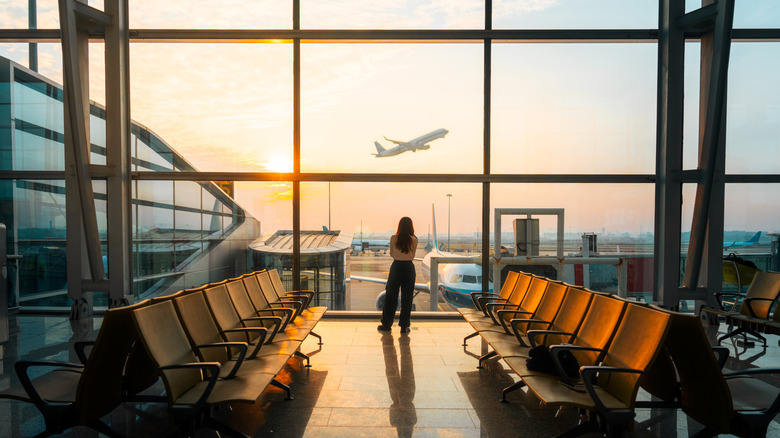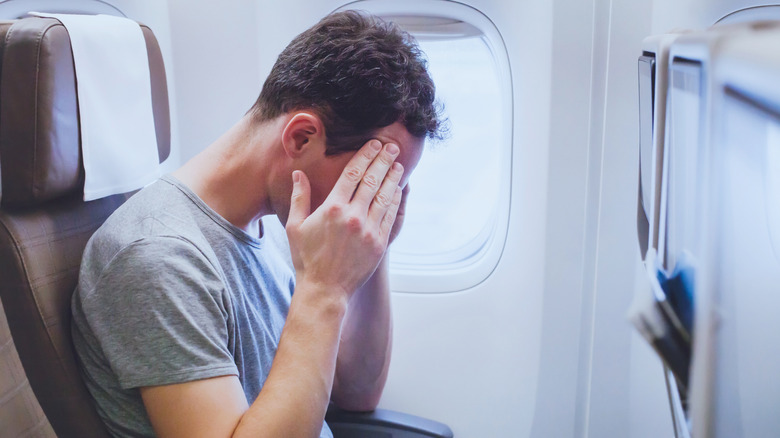Are Flights Really Less Safe Than They Used To Be?
These days, the news cycle seems packed with stories of aviation disasters and faulty aircraft, including those from Boeing, whose 737 planes have been involved in many accidents. In fact, over 150 individuals have died in plane crashes as of May 2025 in the United States (via Fox 4 News). Not to mention the various videos of airplane catastrophes that have gone viral. But are flights really less safe than they used to be? Richard Levy from AviationExpertConsulting.com says no. The former American Airlines pilot spoke to Islands exclusively about the safety of air travel.
Levy, who has over 40 years of flying experience, says that travelers have little to worry about. He stated, "Of the thousands of daily commercial flights flown around the world, 99.99% of them run safely and successfully, and fly the intended and planned itinerary from point A to point B. Have there been a few flights as of late that have had non-normal occurrences? Yes." However, with many choosing to stay grounded, Levy has a reminder for travelers.
"The riskiest portion of any commercial flight remains to be the drive to and from the airport," he explains. Indeed, data shows that you are more likely to die from a car crash than a plane crash. Likewise, prospective fliers should be aware that a majority of aviation accidents that do transpire are not commercial flights. This includes the January 2025 plane crash in Philadelphia, which was transporting a medical patient. "There have been a few newsworthy events that did indeed gather media attention, but still do not prove commercial aviation as unsafe," says Levy.
Don't underestimate aviation safety guidelines or your pilot
If you're still feeling spooked about flying, take into consideration that the Federal Aviation Administration (FAA) is working behind the scenes to ensure travelers' safety. One way the government agency does this is by requiring that each airline have a Safety Management System (SMS). In a few words, an SMS determines problems and the proper solutions for them. Richard Levy elaborated on this concept further to Islands, noting that, above all, airlines and pilots prioritize passengers.
He explained, "Two of the many SMS that are taught at various airlines are 'Threat Error Management'(TEM) and 'Risk Resource Management' (RRM). Both TEM and RRM share the common goal for the airline pilot of today: take no unnecessary risk." It's worth mentioning that pilots also perform a preflight inspection to ensure that the aircraft and other factors are in tip-top shape for flying.
That is all to say that if any issues or complications arise, rest assured that your pilot will, if necessary, make the call to delay or cancel the flight. While this can disrupt your travel plans and make the situation a bit chaotic, this is not a decision that's taken lightly by pilots. As Levy noted, "Yes, flying on schedule between the planned departure and destination cities is obviously very important, but safe operation is the ultimate goal and of utmost importance."
Helpful tips for anxious fliers
Whether it's due to the state of the aviation industry or not, it's only natural to feel apprehensive about flying. Nevertheless, you're not alone. Approximately 40% of Americans have a fear of flying (via The Hill). If you're nervous, here's what experts recommend to feel safe in the air. Speaking to Islands, Richard Levy says passengers should assess the facts: the chances of your flight not going as planned are slim to none. Additionally, he recommends you talk to your pilot to ease your mind.
Levy said, "I know that I always enjoyed assuring nervous fliers about the safety of today's flight, whether the duration was an hour or 17 hours. Sometimes just seeing airline pilots as real people with families and similar feelings about love for travel and life relaxes the nervous flier." Alternatively, you could speak to the flight attendant; they, too, can provide you with peace of mind. Of course, it's never a bad idea to book a flight with the safest airlines in the world.
Moreover, it's important to remember that turbulence can happen, but it does not mean anything is amiss. If this makes you feel especially uneasy, keep in mind that choosing a seat at the front of the plane could reduce the amount of turbulence you feel. All that said, Levy hopes that passengers can savor the journey to their destination. "Enjoy the view, the meal, a good book, a deep snooze, and a warm conversation with someone important to you, or even a chat with a new acquaintance. Does flying have its risks? Yes. But so does waking up in the morning and living your life."


